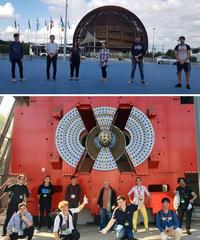Kick-off for the Beamline for Schools competition: the teams have arrived at CERN and at DESY.
In the last few months, we've all had to get used to the fact that this year, nothing is as it used to be. The high school competition Beamline for Schools organised by CERN is no exception. While two international groups of pupils were supposed to meet each other and perform their experiments beside one another at DESY, only one team could actually make it to Hamburg: eight pupils from the Werner-Siemens-Gymnasium in Berlin, travelling for Beamline for Schools under the team name “ChDR Cheese”. Their fellow winners—the six-member team “Nations’ Flying Foxes” from the International School in Geneva—will have to supervise their experiment from Switzerland because the Canton of Geneva has recently been declared an infection risk area by the leading German public health organisation, the RKI. They will be connected to all lectures and control rooms via a dedicated livestream, allowing them to conduct their experiment in Hamburg virtually.
Beamline for Schools is an international competition open to all secondary school students worldwide and is organised by CERN, the European Organization for Nuclear Research in Geneva, Switzerland. Students get together in teams, think about an experiment that can be carried out using a particle beam from accelerators and write a short "research proposal". All applications are then evaluated by researchers from CERN and DESY and two winning teams are selected. These teams are invited to conduct their submitted experiments on beamlines in the test beam together with scientists from CERN and DESY. Because the particle accelerators at CERN are currently undergoing a long shutdown phase, the competition is taking place at DESY for the second year in a row.
Since the introduction of the Beamline for Schools competition in 2014, more than 11,000 students from 91 countries have taken part. This year, 198 teams from 47 countries worldwide submitted proposals for the seventh edition of the competition, despite adverse circumstances due to the COVID pandemic.
"We are very happy that the team 'ChDR Cheese' is now here on the DESY campus! It will certainly be an extraordinary and exciting two weeks," says project manager Sarah Aretz. "The virtual exchange with the team at CERN will be a completely new experience for everyone". The teams can expect a series of safety briefings and introductions to software and data analysis (as well as a sightseeing day in Hamburg) before moving into the control room like real scientists.
"It is overwhelming to be here now," says Philipp Loewe from the "ChDR Cheese" team. "So many impressions and emotions all at once! Most of all it's a great feeling that we can now do an experiment ourselves and thus become part of the world of science."
While the "Nations' Flying Foxes" team will search for new particles, the Berlin group will use a physical effect – Cherenkov Diffraction Radiation (ChDR) – to check if they can improve the quality of particle beams in accelerators.
Beamline for Schools is an educational and outreach project funded by the CERN & Society Foundation and supported by individual donors, foundations and companies. For 2020, the project is partly supported by the Wilhelm and Else Heraeus Foundation with additional contributions from the Arconic Foundation, Amgen Switzerland AG and the Ernest Solvay Fund, which is managed by the King Baudouin Foundation.








